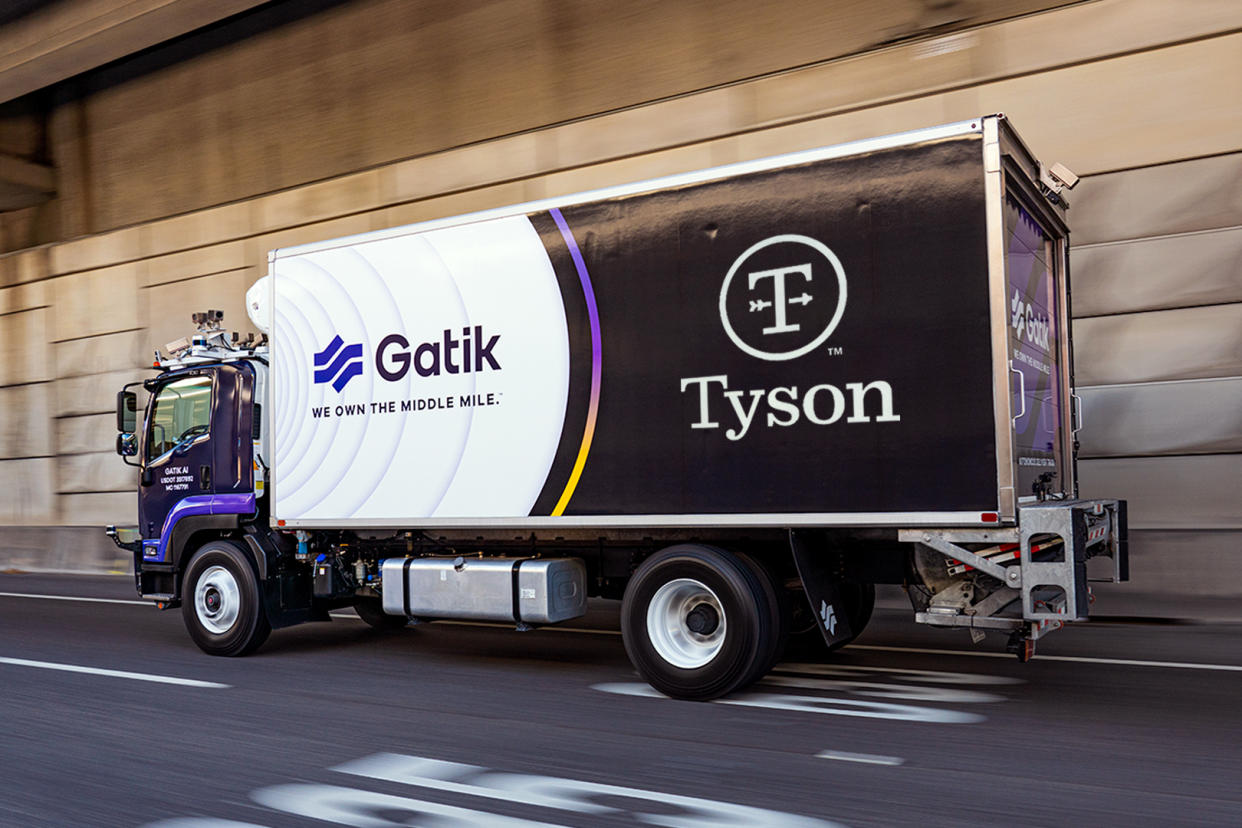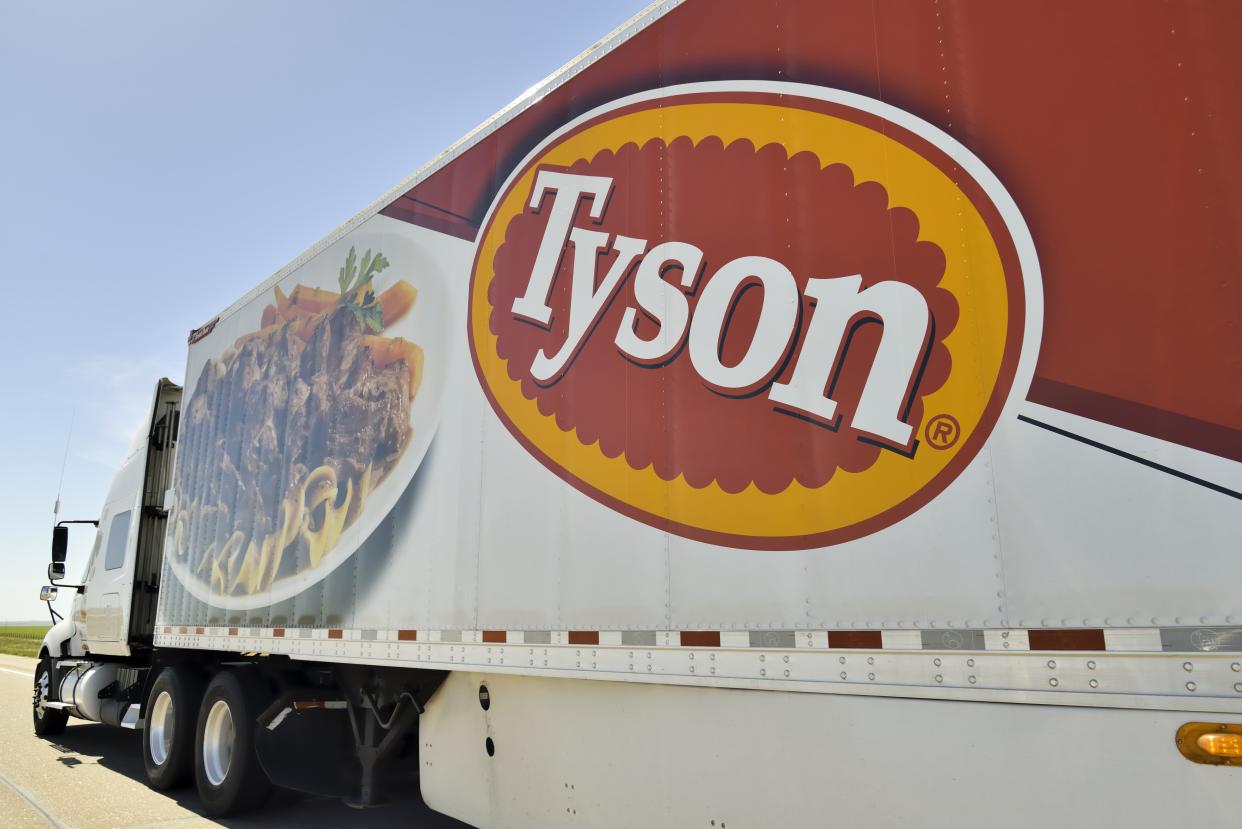Tyson enlists self-driving trucks to deliver chicken wings and hot dogs
Your chicken wings, hot dogs, and breakfast sausage could soon essentially transport themselves with the help of artificial intelligence.
Tyson Foods (TSN) announced Wednesday it teamed up with autonomous vehicle maker Gatik to test out driverless trucks in northwest Arkansas.
The multiyear contract kicked off last week with a four-truck fleet of Class 7 autonomous vehicles created to carry heavier frozen meats, and the next several trucks will be delivered in about a month, Tyson Foods vice president of transportation Patrick Simmons told Yahoo Finance.
Don't expect these self-driving trucks at your local supermarket, though. Right now they are being used to make short deliveries from a production plant to multiple cold storage facilities, which are typically 10 to 15 miles apart.
"We’re after what I would call our middle mile," Simmons said. "If everything goes well, which we plan on it being that way at scale, there's really 40 sites that we've identified across the United States at some point in the future that we could roll this out."

For the time being, drivers will continue to be in the vehicles as the AI software learns the routes. Eventually, the trucks will be completely driverless, which could happen in as soon as six months.
Other companies that Gatik has worked with include Kroger (KR), which in March announced plans to deliver groceries to stores in Dallas, and Tyson's neighbor in northwest Arkansas, Walmart (WMT).
'A better fit'
According to Simmons, now is the right time for innovation around transportation.
"Coming out of the lessons of COVID, there was a lot of supply chain struggles, not just within our industry but within every industry across the globe," he said. "This enables us to become more self-reliant, more agile, mobile, flexible, and better serve the business and ultimately our customers."
Tyson turned to AI technology in part due to the truck driver shortage "that was amplified during the pandemic" and still exists today, Simmons said. He also stressed that the autonomous trucks were not about eliminating jobs but finding a better fit for existing drivers.
"Truck drivers don't like to do those short-term runs that are in and out of traffic," he said. "They like to get out on the highway and go 65 miles an hour and go 300, 400, 500 miles at a time."

The AI component of the driverless truck also allows the company to use each vehicle longer than a traditional truck driver would be able to based on safety rules from the Department of Transportation. Instead of having drivers operate vehicles for 11 hours at a time, Tyson is planning on running the driverless trucks 18 hours a day.
As the company looks to the future, Simmons also said the efforts could help attract younger generations of workers, who are generally more interested in technology careers and will be able to manage the fleet remotely or by drone.
"That's a productivity gain for us," Simmons said. "Then we're able to repurpose our truck driver. It's a better fit for what that driver would like to be doing anyhow."
Tyson faces 'challenging' year
Tyson has been looking to get back on its feet after a string of disappointing quarterly results. Shares of the mass food producer are down 30% over the past 12 months.
Tyson Foods CEO Donnie King told Yahoo Finance recently in an exclusive interview that there has never been "a more challenging time" in his 40 years in the business. "The macro environment is challenging, and it'll continue to be challenging for a bit," King added.
In the most recent quarter, Tyson's earnings fell short of estimates as weakened consumer demand and a supply glut caused prices to fall for many products.
The company also shared plans to shutter three chicken-processing locations in October of this year, including facilities located in North Little Rock, Ark.; Noel, Mo.; and Dexter, Mo. The fourth location — in Corydon, Ind. — will close on or around March 1, 2024.
Following the results, JPMorgan analyst Ken Goldman wrote that the closures were "helpful to margins but not to an industry that remains arguably over-supplied."
"Either way, it’s good to see the company lean into what Donnie King sometimes does best — run efficient businesses — and we think it’s reasonable to model MSD operating margins for this segment as soon as 4Q23," Goldman added.
As part of those plans to streamline operations, Tyson also said it will launch a new supply chain center and announced that Brady Stewart, who previously oversaw the fresh meats business, will become the company's chief supply chain officer.
As far as the outlook for 2023, the company now expects total sales between $53 billion and $54 billion for the full year, with sales growth flat year over year.
—
Brooke DiPalma is a reporter for Yahoo Finance. Follow her on Twitter at @BrookeDiPalma or email her at bdipalma@yahoofinance.com.
Click here for the latest stock market news and in-depth analysis, including events that move stocks
Read the latest financial and business news from Yahoo Finance
